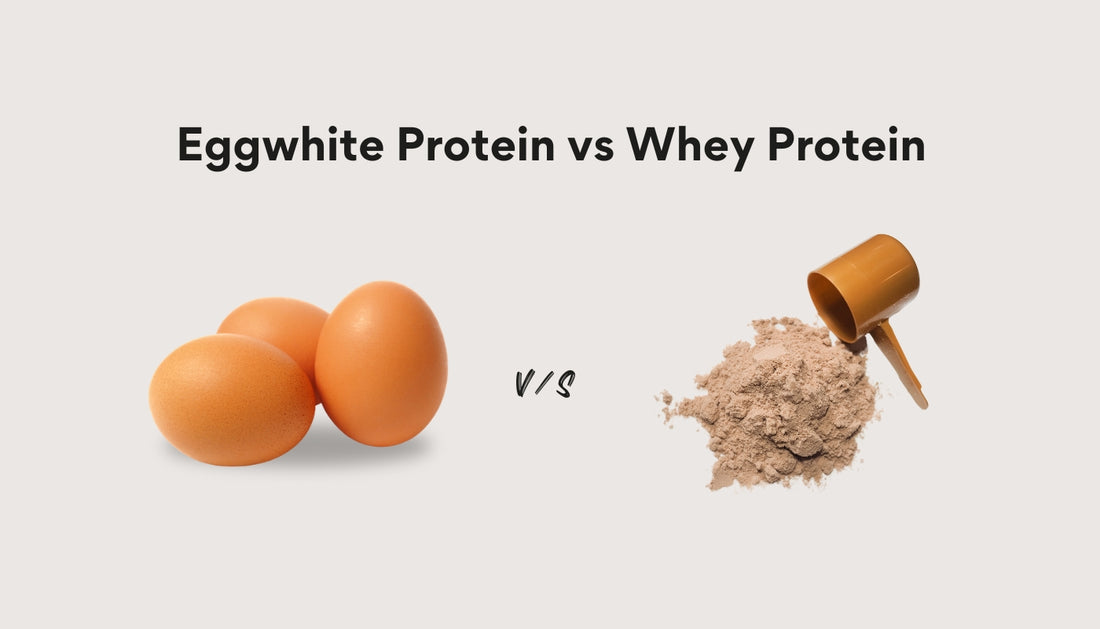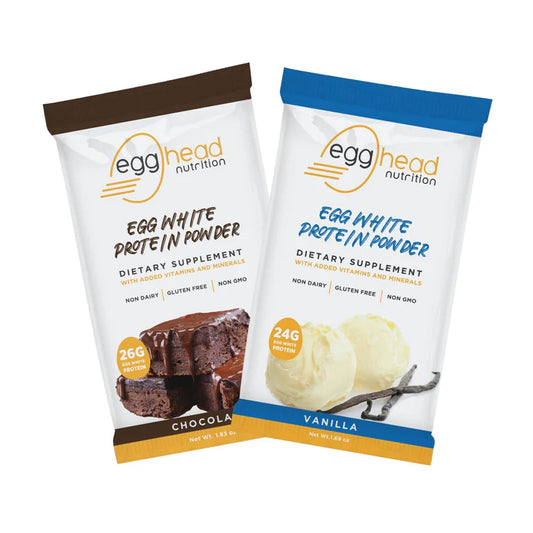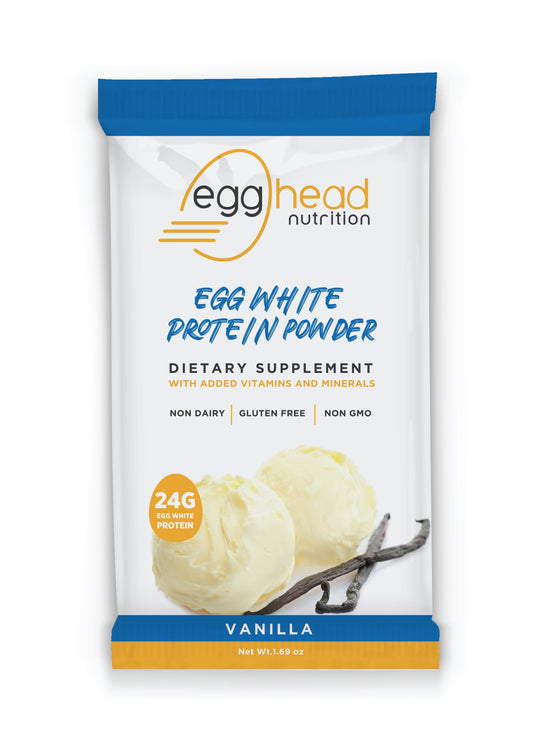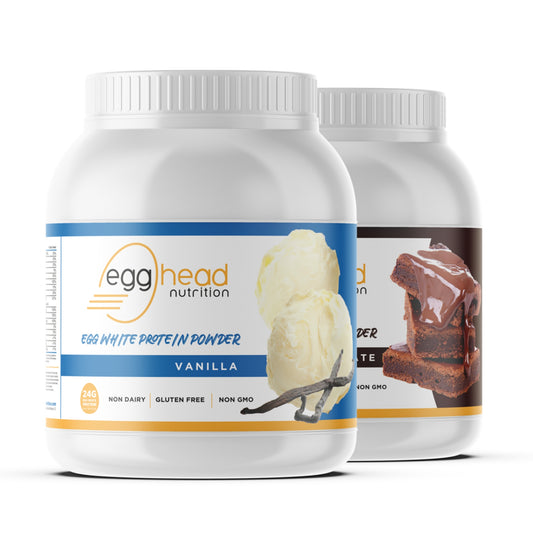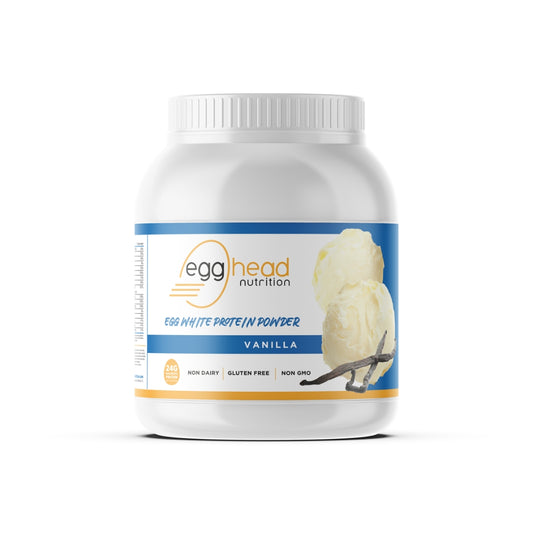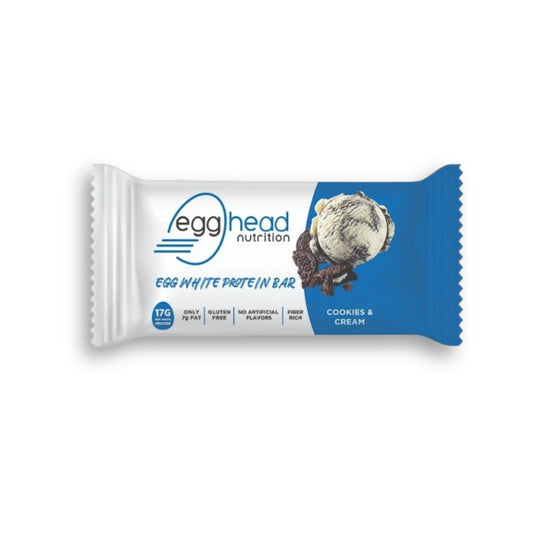When it comes to choosing a protein supplement, the decision often boils down to two popular choices: egg white protein and whey protein. Both are complete proteins, meaning they contain all nine essential amino acids that our bodies can't produce on their own. However, the similarities largely end there.
In this comprehensive guide, we'll delve into the differences between egg white protein and whey protein, focusing on their nutritional profiles, digestibility, impact on muscle growth, and more.
As we navigate through this comparison, you'll discover that egg white protein emerges as a superior choice in several key areas. From its high digestibility to its lower environmental impact, egg white protein offers unique advantages that make it a standout choice for optimal fitness.
What makes egg white protein a superior choice for optimal fitness?
Egg white protein is the ultimate choice for your nutritional needs due to its exceptional digestibility, muscle-building efficiency, low allergenic profile, sustained energy benefits, and environmental sustainability. Unlike whey protein, which can cause digestive issues for individuals with lactose intolerance and irritable bowel syndrome (IBS), egg white protein offers a gentle alternative that is easy on the digestive system.
How does egg white protein compare to whey protein in terms of digestibility?
Digestibility is a crucial factor when choosing a protein supplement. It determines how effectively your body can break down and absorb the protein, which in turn affects how much of the protein's nutritional value you actually receive.
Egg white protein is renowned for its high digestibility. It has a Protein Digestibility Corrected Amino Acid Score (PDCAAS) of 1.0, which is the highest possible score. This score indicates that egg white protein contains all the essential amino acids in the right proportions and that your body can easily digest and absorb them. This high digestibility means that when you consume egg white protein, you're getting the maximum possible nutritional benefit.
On the other hand, while whey protein also has a high PDCAAS, it can be more challenging to digest for some individuals. Whey protein is a dairy product, and as such, it contains lactose. Individuals with lactose intolerance or sensitivity may experience digestive discomforts, such as bloating, gas, and diarrhea when they consume whey protein. This can limit the amount of protein they're able to absorb and utilize.
How does egg white protein support muscle building?
Muscle building relies heavily on protein, specifically the essential amino acids that the body can't produce on its own. Egg white protein is a complete protein, meaning it contains all these essential amino acids. This makes it an excellent choice for supporting muscle recovery, repair, and growth.
Research suggests that egg white protein is 21% more efficient than whey protein in promoting muscle growth and development. This is likely due to the high bioavailability of its amino acids, which means they can be readily absorbed and used by the body.
In contrast, while whey protein also supports muscle building, it may not be as efficient as egg white protein. Some individuals may also find whey protein harder to digest, which could limit the amount of protein their body can use for muscle building.
Is egg white protein suitable for individuals with dairy sensitivities or allergies?
Yes, egg white protein is a game-changer for individuals with dairy sensitivities or allergies. Unlike whey protein, which is derived from milk, egg white protein is derived from eggs and does not contain lactose or other dairy components. This makes it a safe and viable option for those who need to avoid dairy.
Whey protein, on the other hand, can cause allergic reactions or digestive issues in individuals with milk allergies or lactose intolerance. Symptoms can range from mild (like bloating and gas) to severe (like hives and difficulty breathing). By choosing egg white protein, individuals with dairy sensitivities or allergies can avoid these potential issues.
How does egg white protein contribute to sustained energy and reduced muscle breakdown?
Egg white protein provides a slow and steady release of amino acids, which can lead to sustained energy levels and minimized muscle breakdown. This is because the body uses amino acids for energy when carbohydrate stores are low. A slow and steady release of amino acids ensures that the body has a consistent energy source, reducing the need for it to break down muscle tissue for energy.
In contrast, whey protein is known for its rapid absorption and digestion. While this can provide a quick burst of energy, it may also lead to energy crashes when the readily available amino acids are used up. This could potentially lead to greater muscle breakdown if the body turns to muscle tissue for energy.
How does choosing egg white protein support environmental sustainability?
Choosing egg white protein supports environmental sustainability because egg production has a considerably lower environmental footprint compared to dairy production. This includes lower greenhouse gas emissions, less water pollution, and less habitat destruction.
The dairy industry, from which whey protein is derived, is known for its significant environmental impact. This includes high greenhouse gas emissions, water pollution from manure, and habitat destruction due to land clearing for grazing.
By choosing egg white protein, you're not only making a choice that's good for your body but also one that's good for the planet.
Can egg white protein help with weight loss?
Yes, egg white protein can play a significant role in weight loss strategies. The key to its effectiveness lies in its high protein content, low-calorie count, and satiating properties.
Protein is known to promote feelings of fullness, which can help control appetite and reduce overall calorie intake. This is particularly beneficial for weight loss, as consuming fewer calories than you burn is the fundamental principle of weight loss.
Egg white protein, being a high-quality protein source, provides a substantial amount of protein per serving while being low in calories. This makes it an excellent choice for those looking to increase their protein intake without consuming excess calories.
In addition, the high protein content of egg white protein can aid in preserving lean muscle mass during weight loss. When you're in a calorie deficit, your body can start to break down muscle tissue for energy. Consuming adequate protein can help prevent this, ensuring that more of the weight you lose comes from fat rather than muscle.
In contrast, while whey protein also provides a high amount of protein, it's typically higher in calories than egg white protein. This could make it less effective for weight loss, especially for those closely monitoring their calorie intake.
How does egg white protein affect energy levels during workouts?
Egg white protein can positively impact energy levels during workouts due to its slow and steady release of amino acids. Amino acids, the building blocks of protein, can be used by the body for energy, especially during intense or prolonged exercise.
The slow and steady release of amino acids from egg white protein ensures that your body has a consistent supply of energy throughout your workout. This can help prevent energy crashes and enhance your endurance, allowing you to work out for longer periods and at higher intensities.
In addition, the high-quality protein in egg white protein supports muscle recovery and repair after workouts. This can help reduce muscle soreness and fatigue, further enhancing your energy levels and workout performance.
On the other hand, whey protein is known for its rapid absorption and digestion. While this can provide a quick burst of energy, it may also lead to energy crashes when the readily available amino acids are used up. This could potentially affect your workout performance, especially during longer or more intense workouts.
In summary, the slow and steady release of amino acids from egg white protein can provide sustained energy during workouts, enhance workout performance, and support post-workout recovery. This makes it a superior choice for those seeking to maximize their energy levels and workout performance.
Does egg white protein contribute to a balanced diet?
As a high-quality protein, egg white protein provides all the essential amino acids your body needs but can't produce independently. These amino acids are crucial for various bodily functions, including muscle growth and repair, hormone production, and immune function. Consuming adequate protein can also help control appetite and support weight management, making egg white protein a great choice for those looking to maintain or lose weight.
Regarding calorie content, egg white protein is lower in calories compared to many other protein sources, including whey protein. This makes it an excellent choice for those who are watching their calorie intake or trying to lose weight.
Egg white protein is also rich in various nutrients, including vitamins and minerals. For instance, it's a good source of riboflavin (vitamin B2) and selenium, both of which are essential for overall health. Riboflavin plays a key role in energy production and eye health, while selenium supports thyroid health and has antioxidant properties.
In contrast, while whey protein also provides high-quality protein and various nutrients, it's typically higher in calories and may contain lactose, which can cause digestive issues in those with lactose intolerance.
| Egg White Protein | Whey Protein | |
| Protein Proficiency Ratio | 3.9 | 3.2 |
| Calories | 110 | 120 |
| Net Protein Utilization | 94 | 92 |
| Fat | 0g | 2g |
| Biological Value | 100 | 104 |
| PDCASS | 1.00 | 1.00 |
Is egg white protein a better option for vegetarians compared to whey protein?
Egg white protein is indeed a better option for many vegetarians compared to whey protein. The reason lies in the source of these proteins and the dietary preferences of different types of vegetarians.
Egg white protein is derived from eggs, which are accepted in ovo-vegetarian and lacto-ovo vegetarian diets. These types of vegetarians consume both dairy products and eggs, excluding meat, poultry, and fish.
On the other hand, whey protein is a by-product of cheese production. While it is a dairy product and therefore accepted by Lacto-vegetarians and lacto-ovo vegetarians, some vegetarians may choose to avoid it. The reason is that the production of cheese (and therefore whey) often involves the use of rennet, an enzyme traditionally sourced from the stomachs of ruminant animals. Although there are vegetarian cheeses made with microbial or genetically engineered rennet, not all cheese (and whey) manufacturers use these alternatives.
Therefore, for vegetarians who avoid animal-derived rennet, egg white protein is a safer and more ethical choice. It provides all the essential amino acids needed for optimal health without the ethical concerns associated with traditional cheese and whey production.

